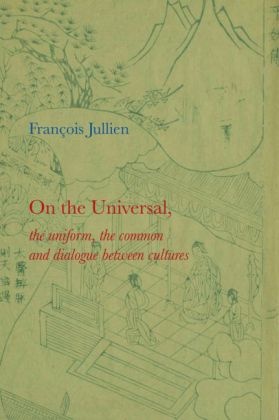Read more
Francois Jullien is a philosopher with a specialist knowledge of China and Chinese thought. He uses Chinese thought as a mirror to reflect on the West and as an invitation to think about difference and otherness. This book focuses on the idea of the universal and analyses different ways of thinking about it.
List of contents
Foreword
Itinerary
I. On the Universal
II. On the Uniform
III. On the Common
IV. From the advent of the State to the cosmo-political extension of the common
V. The other level: the universal as a logical category
of philosophy
VI. First encounter of the universal and the common:
Roman citizenship extended to the Empire
VII. Paul and the matter of going beyond all communitarianism in Christian universalism
VIII. Does the question of the universal arise in other cultures?
IX. Are there universal notions? A cultural universal having ideal status
X. On Human rights - the notion of universalising
XI. If it is neither synthesis nor denominator nor foundation, from where does the common arise?
XII. On 'Cultures': divergences of language - the resources of thought
XIII. To construct the dialogue between cultures to counter the surrounding uniformisation; human self-reflection
About the author
François Jullien is professor at the Universit Paris-Diderot and a member of the Institut universitaire de France.
Summary
* Francois Jullien is a philosopher with a specialist knowledge of China and Chinese thought. He uses Chinese thought as a mirror to reflect on the West and as an invitation to think about difference and otherness. * This book focuses on the idea of the universal and analyses different ways of thinking about it.
Report
""A valuable contribution to the field. The controversies he identifies are only going to become more deep-set in our increasingly multi-polar world, and given the current geo-political climate we need more than ever to agree on the role that universal Human Rights may play in an increasingly globalised world."
LSE Review of Books
"François Jullien poses the question of dialogue between cultures in a way altogether different from the loose talk that tends to surround this topic, re-examining, in an insightful and rigorous fashion, the problem of the universal - an ambition hardly surprising in an author who is both a philosopher and a sinologist. If there is a problem, explains Jullien, it is because the universal - that emblematic category of Western civilization, the source of its vitality for centuries - continues to be challenged and to find itself in opposition to the rights linked to the irreducible singularity of cultures ... Here we find a rich and agile thought, harvesting new ideas from philosophical tradition, drawing on a detailed knowledge of cultures and clearly interrogating the founding ideological moments of European civilization."
Etudes: Revue de culture contemporaine

